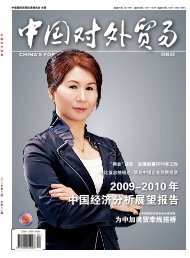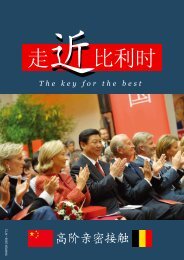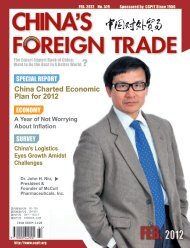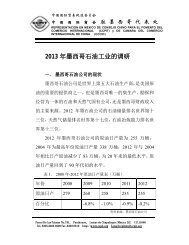F REIGN TRADE - 中国国际贸易促进委员会
F REIGN TRADE - 中国国际贸易促进委员会
F REIGN TRADE - 中国国际贸易促进委员会
You also want an ePaper? Increase the reach of your titles
YUMPU automatically turns print PDFs into web optimized ePapers that Google loves.
cent “Global Investment Trends Monitor” issued by theUNCTAD (United Nations Conference on Trade AndDevelopment) on April 12, the global FDI in 2011 amountsto 1.66 trillion USD, up by 16% on a year-on-year basis, butstill 25% less than the peak of 2007. Also the FDI conditionhas improved this year; investors are still cautious facing thefragile world economy.It shall be noticed that the gloomy European economyhas delivered huge impacts on its investment in China. Datashows that during January to April the investment from 27European countries has greatly dropped, with paid-in investmentshrinking to 1.9 billion USD, down by 27.9% yearon-year,again leading to the negative growth of China’sFDI. “Because of the impacts from European debt crisis, theinvestment from the European Union to China has been fallingdown. Also, the bilateral exports and economic relationsbetween China and the European Union have also turnedgloomy under such a background.” said Shen.“The fragile recovery of the world economy has madethe pie of world FDI much smaller, while the EuropeanUnion and U.S. are encouraging the return of industries, andemerging countries including BRIC have promoted morefavorable investment policies, splitting the stream of internationalcapital.” said He Manqing, director of the TransnationalCorporation Research Center of the Ministry ofCommerce. She added that China is placing more focus onthe quality and efficiency of investment because of the risinglabor costs and restraints by environmental protections.Bian Weihong, senior analyst of the International FinanceResearch Institute of the Bank of China, commentedthat as the largest trading partner of China, the EU is sufferinga serious debt crisis with negative growth for 2 quarters.The recession of the European economy has lowered thelocal willingness to invest in China. Also, the U.S. growthrate for the first quarter is lower than expected, and therecent economic data also turns negative. These factors combinedhave contributed to the negative growth of China’sFDI.Zhou Yu, director of the international financial currencyresearch institute, Shanghai Academy of Social Sciences,said that the economic meltdown of the U.S. and EUhave made their companies unable to expand financially,leading to the decrease of FDI scale. Most companies haveto adjust their investment according to demands, but facingthe unclear economic prospects, most companies will chooseslowing down the investment and decrease the scale.Cheng Dawei, chief expert of WTO affairs center inBeijing, told reporter that “the current domestic economiccondition will make the investment slowdown continue,”she mentioned that this is mainly about the pressure fromthe world economic environment: the EU debt crisis has noappropriate solution, and the investment ability of Europeancompanies is decreasing. The policies adopted by the U.S.government to encourage the reflux of capital show that theU.S. economic recovery is not as rosy as the report describes.Besides, emerging countries are promoting more favorablepolicies to attract foreign capital, causing split of the internationalcapital.Rising labor costA responsible person at an American-funded electroniccompany in Suzhou shared with the reporters thatthe current rising speed and magnitude of China’s laborcosts would have been unimaginable three years ago. Theescalating costs and the high turnover rate it triggers havebrought huge pressures on the operation of foreign-fundedcompanies in China. But he also mentioned that the companyhe worked for will not exit from China in the shortrun, because the Chinese market still outperforms thoseat the Southeastern countries in terms of infrastructuralfacility and quality of human resources, although the laborcosts of the latter may be lower. But if the rise of laborcosts continues, they would consider moving the factoriesto other regions. Another Japanese-funded car companyin Zhejiang also said that it will place more focus on theR&D and design at the Chinese market, and move thecomponent R&D center to China.“Currently China still have labor cost advantage, butsuch advantage is shrinking. The rising labor costs herehave forced those low-cost investments into other markets,”Said Zhou Yu, director of the international financialcurrency research institute, Shanghai Academy of SocialSciences. The labor costs, technological ability, infrastructuralfacility and distribution of high-stream and lowstreamindustry chain are important factors considered byinvestors. Therefore, those small companies more susceptibleto the labor costs but less susceptible to the industrychain will easily move to regions where the labor costs arelow.Such change has been felt by many foreign-funded10

















